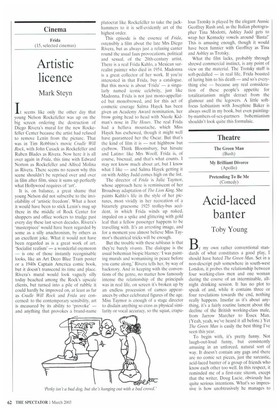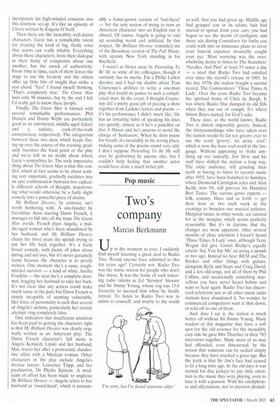Acid-laced banter
Toby Young
By my own rather conventional standards of what constitutes a good play, I should have hated The Green Man. Set in a non-descript pub somewhere in south-west London, it probes the relationship between four working-class men and one woman during the course of an interminable, allnight drinking session. It has no plot to speak of and, while it contains three or four revelations towards the end, nothing really happens. Insofar as it's about anything, it's a fairly routine lament about the decline of the British working-class male, from Jarrow Marcher to Essex Man. (Yeah, yeah, we've heard it all before.) Yet The Green Man is easily the best thing I've seen this year.
To begin with, it's pretty funny. Not laugh-out-loud funny, but consistently amusing in an unforced, natural sort of way. It doesn't contain any gags and there are no comic set pieces, just the sarcastic, acid-laced banter of a group of friends who know each other too well. In this respect, it reminded me of a first-rate sitcom, except that the writer, Doug Lucie, obviously has quite serious intentions. What's so impressive is how unobtrusively he manages to incorporate his high-minded concerns into this lowbrow set-up. It's like an episode of Cheers written by Eugene O'Neill.
Then there are the incredibly well-drawn characters. Lucie has a remarkable talent for creating the kind of big, fleshy roles that actors can really inhabit. Everything about these characters, from their dialogue to their litany of complaints about one another, has the smack of authenticity. From time to time, each of them leaves the stage to use the lavatory and the others offer up little bits of insight that strike a real chord. 'Yes!' I found myself thinking. 'That's completely true.' The Green Man lasts only 90 minutes, but by the end I felt I'd really got to know these people.
Finally, The Green Man is blessed with several remarkable performances. Phil Daniels and Danny Webb are particularly good as an embittered, middle-aged failure and a sadistic, cock-of-the-walk entrepreneur, respectively. The antagonism between these two men, which keeps flaring up over the course of the evening, gradually becomes the focal point of the play and we're left in no doubt about where Lucie's sympathies lie. The truly impressive thing about The Green Man is that this conflict, which at first seems to be about nothing very important, gradually escalates into an epic confrontation between two radically different schools of thought, transforming what would otherwise be a fairly slight comedy into a powerful piece of drama.
My Brilliant Divorce, by contrast, isn't worth bothering with. A one-hander by Geraldine Aron starring Dawn French, it manages to fall into all the traps The Green Man avoids. French plays Angela, a middle-aged woman who's been abandoned by her husband, and My Brilliant Divorce charts the three years she spends trying to put her life back together. It's a fairly broad comedy, with plenty of jokes about dating and sex toys, but it's never genuinely funny because the character is so poorly written. One moment she's a sassy, toughminded survivor — a kind of white Aretha Franklin — the next she's a complete doormat, begging her husband to take her back. It's not clear that any actress could make much sense of the part, but Dawn French is simply incapable of seeming vulnerable. Her force of personality is such that several of Angela's actions, particularly her suicide attempt, ring completely false.
One indication that insufficient attention has been paid to getting the character right is that My Brilliant Divorce was clearly originally written as an American play. The Dawn French character's full name is Angela Kennedy Lipski and her husband, Max, leaves her after a protracted, clandestine affair with a Mexican woman. Other characters in the play include Angela's divorce lawyer, Lawrence Tripp, and her psychiatrist, Dr Phyllis Epstein. A modicum of effort has been made to anglicise My Brilliant Divorce — Angela refers to her husband as 'round-head', which is presum
ably a home-grown version of 'butt-head' — but the very notion of trying to turn an American character into an English one is absurd. Of course Angela is going to end up sounding weird and artificial. In this respect. My Brilliant Divorce reminded me of the Broadway version of The Full Monty, with upstate New York standing in for Sheffield.
I wasn't as blown away by Pretending To Be Me as some of my colleagues, though it certainly has its merits. I'm a Philip Larkin devotee and I had my doubts about Tom Courtenay's abilities to write a one-man play that would do justice to such a complicated man. In the event. I thought Courtenay did a pretty good job of piecing a show together from Larkin's letters and poems — it's his performance I didn't much like. He has an irritating habit of speaking his lines too quickly, almost as if he's a panellist on Just A Minute and he's anxious to avoid the charge of 'hesitation'. When he does pause for breath, it's invariably in the wrong place, making some of the poems sound very odd. I don't suppose Pretending To Be Me will ever be performed by anyone else. but I couldn't help feeling that another actor would have done a much better job.



















































































 Previous page
Previous page